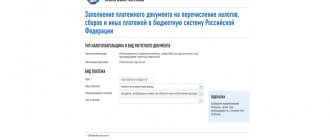The taxpayer has the right to independently determine the list of direct expenses
In accordance with paragraph 1 of Art.
318 of the Tax Code of the Russian Federation, production and sales costs incurred during the reporting (tax) period are divided into direct and indirect. Direct costs may include, in particular: - material costs determined in accordance with paragraphs. 1 and 4 paragraphs 1 art. 254 Tax Code of the Russian Federation; - expenses for remuneration of personnel involved in the production of goods, performance of work, provision of services, as well as expenses for compulsory pension insurance, used to finance the insurance and funded parts of the labor pension, for compulsory social insurance in case of temporary disability and in connection with maternity , compulsory medical insurance, compulsory social insurance against industrial accidents and occupational diseases, accrued on the specified amounts of labor costs;
- the amount of accrued depreciation on fixed assets used in the production of goods, works, services. Indirect expenses include all other amounts of expenses, with the exception of non-operating expenses determined in accordance with Art. 265 of the Tax Code of the Russian Federation, carried out by the taxpayer during the reporting (tax) period. In paragraph 1 of Art.
318 of the Tax Code of the Russian Federation states that the taxpayer has the right to independently determine the list of direct expenses associated with the production of goods (performance of work, provision of services), securing his choice in the accounting policy. Thus, the taxpayer has the right to independently determine the list of direct expenses, securing it in the accounting policy.
Chapter 25 of the Tax Code of the Russian Federation does not contain provisions limiting the taxpayer in attributing certain expenses to production and sales, incl. expenses in the form of insurance premiums, direct or indirect expenses. This is indicated in the Letter of the Ministry of Finance of Russia dated May 25, 2010 N 03-03-06/2/101. In this case, the taxpayer can use the list of direct expenses approved in accounting for profit tax purposes.
In accordance with paragraph 3 of Art. 1 of the Federal Law of November 21, 1996 N 129-FZ “On Accounting”, one of the main tasks of accounting is the formation of complete and reliable information about the activities of the organization and its property status, necessary for internal users of accounting statements - managers, founders, participants and owners of property organization, as well as external investors, creditors and other users of financial statements.
Thus, according to financiers, when forming the composition of direct expenses in tax accounting, the taxpayer can take into account the list of direct expenses associated with the production and sale of goods (performance of work, provision of services), used for accounting purposes. This conclusion was made in Letter of the Ministry of Finance of Russia dated December 19, 2011 N 03-03-06/1/834.
It should be noted that the organization does not have the right to artificially reduce the list of direct expenses. When assigning expenses to one or another group (type), one should proceed from their nature. Thus, the court found that in the accounting policy the taxpayer classified as direct expenses the wages of personnel involved in the production of finished products (works, services), the amount of unified social tax and the costs of compulsory pension insurance used to finance the insurance and funded part of the labor pension accrued for amounts related to direct labor costs.
The organization has not approved the mechanism for distributing direct costs using economically justified indicators for tax accounting purposes. For accounting purposes, the order-by-order method of accounting for production costs is used to group production costs, calculate production costs and generate production results.
For the purpose of maintaining tax and accounting records, the organization has defined various methods for allocating production costs. At the same time, for accounting purposes, expenses are recorded on the basis of primary accounting documents, and for tax purposes, expenses are written off in an arbitrary manner (irrespective of the relevant accounting documents).
At the same time, the organization’s choice of a method for distributing direct and indirect costs must be justified by the technological process and be economically justified. Types of material costs are named in paragraphs. 1 and 4 paragraphs 1 art. 254 of the Tax Code of the Russian Federation. Firstly, these are the costs of purchasing raw materials and (or) materials used in the production of goods (performance of work, provision of services) and (or) forming their basis or being a necessary component in the production of goods (performance of work, provision of services ).
Secondly, these are the costs of purchasing components that undergo installation, and (or) semi-finished products that undergo additional processing from the taxpayer. This list (wages, depreciation, raw materials, components and semi-finished products) can be narrowed down at its discretion by the organization, and expand it.
There are no restrictions. However, according to the requirements of Art. 252 of the Tax Code of the Russian Federation, the taxpayer’s decision must be justified and depends primarily on the type of activity being carried out. Taking into account the foregoing, the court found that the enterprise unlawfully narrowed what was given in paragraph 1 of Art. 318 of the Tax Code of the Russian Federation, a list of direct expenses, excluding from direct expenses the costs of the enterprise for the acquisition of raw materials and materials used in the production of products (performance of work, provision of services) and (or) forming their basis or being a necessary component in the production of products (performance of work, provision of services) services), without any economic justification.
Thus, materials and purchased components, the cost of which is written off as the cost of orders for the main production, are directly included in the composition of the manufactured product, forming its basis, or are a necessary component in the manufacture of products, i.e. should be classified as direct expenses and subject to income tax.
These conclusions were made in the Resolution of the Federal Antimonopoly Service of the Ural District dated May 6, 2010 N F09-3091/10-C3 in case N A71-12937/2009-A25. A similar position is given in another court verdict. In particular, the court found that the taxpayer unlawfully narrowed the provisions given in paragraph 1 of Art. 318 of the Tax Code of the Russian Federation, a list of direct expenses, excluding the material costs of the enterprise from direct expenses for profit tax purposes without any economic justification.
Thus, materials and purchased components, the cost of which is written off as the cost of orders for the main production, are part of the manufactured product, forming its basis, or are a necessary component in the manufacture of products. Consequently, these types of costs for materials are direct costs, because .
they can be attributed directly to the product being manufactured, the work being performed, and they cannot be attributed for the purposes of Ch. 25 of the Tax Code of the Russian Federation to indirect expenses (Resolution of the Federal Antimonopoly Service of the Ural District dated February 25, 2010 N F09-799/10-C3 in case N A71-8082/2009-A5). So, giving the taxpayer the opportunity to independently determine accounting policies, including the formation of the composition of direct expenses , the Tax Code of the Russian Federation does not consider this process as depending solely on the will of the taxpayer.
On the contrary, these standards classify direct costs as costs directly related to the production of goods (performance of work, provision of services). Attention is drawn to this in the Determination of the Supreme Arbitration Court of the Russian Federation dated May 13, 2010 No. VAS-5306/10 in case No. A71-8082/2009. From the norms of Art. Art. 252, 318, 319 of the Tax Code of the Russian Federation, it follows that the taxpayer’s choice regarding expenses that form the cost of manufactured and sold products in tax accounting must be economically justified (Letter of the Ministry of Finance of Russia dated December 29, 2011 N 07-02-06/260).
We suggest you read: Which insurance company to choose for a mortgage
The Ministry of Finance of Russia emphasized that the taxpayer has the right to independently determine a justified list of direct expenses associated with the production of goods (performance of work, provision of services), which relate to the expenses of the current reporting (tax) period, as products, works, and services are sold (Letter of the Ministry of Finance of Russia from 29.11.
2011 N 03-03-06/1/785).List of direct expenses provided for in paragraph 1 of Art. 318 of the Tax Code of the Russian Federation, is not closed, but includes types of direct expenses that can be taken into account by all organizations that are payers of corporate income tax. Moreover, on the basis of paragraph. 10 p. 1 art. 318 of the Tax Code of the Russian Federation, the taxpayer has the right in his accounting policy for tax purposes to determine, along with those provided for in paragraph 1 of Art.
318 of the Tax Code of the Russian Federation and other direct expenses associated with the production of goods (performance of work, provision of services), which, taking into account the specific type of activity of the taxpayer, can also be considered as his direct expenses when calculating corporate income tax. The lists of direct and indirect expenses must be determined in accounting policies for tax purposes.
Without this, it will be problematic for the organization to justify classifying certain expenses as indirect. To illustrate the above, consider the following example from the practice of arbitration courts. During the audit, the tax inspectorate found that the company, for profit tax purposes, as part of expenses associated with production and sales, took into account as indirect expenses the costs of compulsory pension insurance, used to finance insurance and the funded parts of the labor pension to be included in direct expenses.
The court found that the procedure for accepting expenses for compulsory pension insurance for tax purposes by an enterprise has not been determined. In its accounting policy, the company established that direct costs are determined by it in accordance with Art. 318 Tax Code of the Russian Federation. A special procedure for allocating costs to direct and indirect expenses and a specific list of direct expenses is not defined in the accounting policy.
Based on the foregoing, the court concluded that the controversial costs of compulsory pension insurance, used to finance the insurance and funded parts of the labor pension, the enterprise should have taken into account as part of direct expenses (Resolution of the Federal Antimonopoly Service of the Volga-Vyatka District dated November 20, 2009 in case No. A82-7247 /2008-99).
Settings
In the form of the organization's accounting policy, it is necessary to indicate the type of insurance premium tariff applied to the organization. Menu: Enterprise – Accounting policies – Accounting policies of organizations
Desktop tab: Enterprise – Accounting policies of organizations
The choice of tariff is made on the “Insurance Premiums” tab. The list for selecting tariff types displays only those that can be applied under the accounting policy parameters selected for a given organization (taxation system, tax regimes):
A list of all types of tariffs with rates is available through the menu: Salary - Accounting for personal income tax and taxes (contributions) with payroll - Tariff of insurance contributions.









